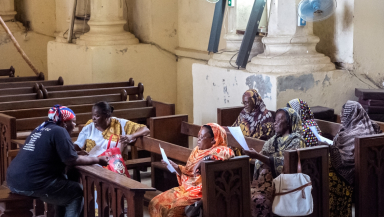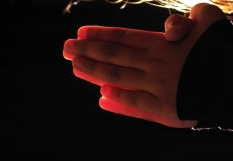
On the face of it it's a progressive, rallying call to kindness and compassion. That old evangelical mantra, drummed into so many of us from a young age, is meant to encourage us to prioritise God's love for everyone, over our awareness of his anger about sin. But that's not all that "love the sinner, hate the sin" is about. It has other meanings and connotations, and I think it also has a profoundly negative effect on us when we try to put it into practice.
The problem lies in that fourth word: 'hate.' It appears in the Bible around 80 times, mostly in the Old Testament, and mainly in the context of 'not hating your brother.' Occasionally the word is used to describe the fierce anger of God, e.g. "his soul hates the wicked" (Psalm 11:5). In a single instance, it's used by Paul as an instruction to us as followers of Jesus: "Hate what is evil, cling to what is good" (Romans 12:9).
That's not the same as "love the sinner, hate the sin", however.
That six-word phrase is often used as a way for Christians to claim that we love people despite the flaws we perceive in them. Historically, it's perhaps most often been applied in the context of human sexuality, although there are plenty of other circumstances in which the phrase is used. What it's communicating, in essence, is that while we're inevitably going to make judgements about each other, we should put them to one side and focus on the fact that God loves all of us despite our sin.
I'm not suggesting for one second that we shouldn't love sinners, or refer to each other in that way. We're all broken, we've all fallen way short of the perfect standard of God (Romans 3:23), we'd all be sunk if it weren't for his Amazing Grace. And we're absolutely, definitely, called to love one another, not as penance, but as a heartfelt response to Him.
But are we really meant to hate the sin in each other?
Hating the expression of sin in someone else is a long way from simply hating what is evil. I can hate human trafficking with a passion, for instance, but the moment I personalise that evil and start despising the acts of individual traffickers, it is absolutely impossible for me to still feel and practice unconditional love toward those people. And that, astonishingly, is the standard that Christ calls us to when he tells us to radically love the world around us, and follow his example of total submission. Jesus loves human traffickers, and he asks us to do so too.
Jesus also hates human trafficking, and we're also called to be his hands and feet in fighting it. But while we should seek justice, and that inevitably means punishment for individual 'sinners', we must never allow ourselves to burn with anger about the actions of those people. There's only a hair's breadth journey from hating their sin, to hating an aspect of them. At which point, unconditional love becomes corrupted.
Isn't this all just semantics? I don't think so. I believe that famous evangelical phrase has permitted a reduced version of true, Christ-like love for far too long. It has also allowed many of us to hide our prejudices, instead of working through them honestly. Whatever your theology of gender or same-sex attraction for instance (e.g. whether homosexual activity is 'sin', or whether it's right for people to undergo gender reassignment surgery), the moment we say we're going to love LGBT people 'in spite' of their error, and simply 'hate' their behaviour in some kind of vacuum, we're offering a cheap, perhaps worthless version of acceptance and hospitality.

The phrase, and the felt need for it, perhaps all stems from a misunderstanding of sin and who's problem it is to deal with. Of course I'm meant to address my own sin (1 John 1:9 etc), and there's a biblical imperative, too, to gently watch out for each other, and seek to restore those who've clearly wandered off the path (Galatians 6:1-2). But this isn't the language of hatred; Paul even uses the phrase "in a spirit of gentleness" so that we're absolutely clear about that. Ultimately, the responsibility for dealing with our sin, and with every area of brokenness in our lives, lies between us as individuals and with God. When we take it upon ourselves to judge and hate aspects of each other, we make their sin about us. It's like we don't trust God to deal with it on his own.
'Hating the sin' is ultimately what leads supposed followers of Christ to attack abortion clinics, picket army funerals and commit terrible atrocities against communities who are 'different.' These are hate crimes, and they're as far from an accurate reflection of Christ as you can get. We should never be the hate people; we're a people of love – given that primary instruction straight from our King's mouth. Jesus called us to love sinners. Let's leave it at that.
Martin Saunders is a Contributing Editor for Christian Today and the Deputy CEO of Youthscape. You can follow him on Twitter: @martinsaunders

















